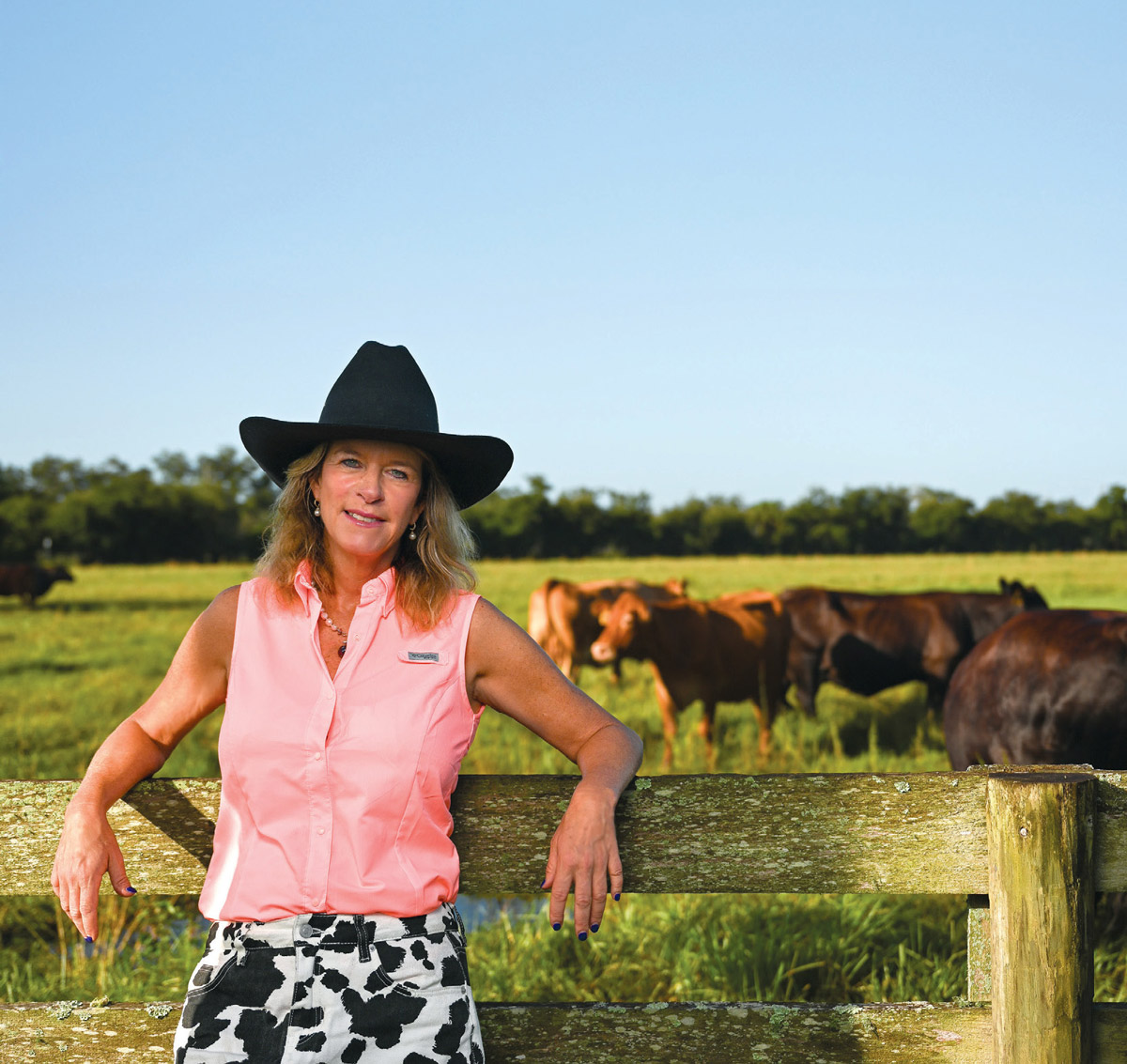Walking the Talk
Elizabeth Moore
My conversation with renowned philanthropist Elizabeth Moore began on the topic of weeds. Yes, weeds. Instead of complaining about all the weeds thriving on her East Sarasota ranch, Moore was quite cheerful as she relayed how many made great additions to her salads and omelets.
Moore has always been rooted in nature and protective of wild-life. She grew up exploring the woods behind her Massachusetts home and chasing greased pigs at the country’s oldest agricultural fair in Topsfield, MA. Moore spent high school exploring the cliffs and coastline of Rhode Island. College might have taken her to the “middle of nowhere” Ohio, but she quickly discovered and frequented the university farm.
“I even brought one of the farm cats home as a pet,” she chuckles. Moore’s earliest connection to Florida came from visits with her grandparents at their Country Club Shores home on Longboat Key—when it was still a relatively wild Florida. “My grandmother would say ‘Elizabeth, don’t go in that jungle. There are panthers and snakes in there, and alligators,’” says Moore, about the “jungle” across the street. She remembers the joy of fishing off the dock and naming every heron she encountered “Herman.” She also remembers the beauty of the deserted beaches boasting only driftwood and white sand for miles.
“There was, like, no development; no high-rises or anything,” says Moore. “You could just walk for miles. It was pretty amazing.”
Moore’s love of tennis, not nature, brought her back to Florida as a resident in 2000 and this community should be forever grateful. Moore may have the finances to support any cause she chooses. Still, she remains deeply committed to the efforts she is most passionate about and those with which she can be actively involved, such as environmental conservation and land preservation.
“The most important thing to know about me is that I follow my dollars, or I even lead my dollars in philanthropy, by boots-on-the-ground and hands-on work,” says Moore.
Moore is fearless in her efforts—unafraid to get wet scuba diving to transplant corals or to get dirty tromping through the woods on field trips with Ducks Unlimited.
“I want to see with my own eyes what’s going on,” she says.
Moore quickly saw the splendor of Triangle Ranch, which lies just north of Myakka River State Park, when members of the Conservation Foundation of the Gulf Coast first invited her out. (Moore is now on the board.)
“When I got back into the pastures and the woods and I saw the Myakka River. That’s when I went, ‘Wow, this is really beautiful. Somebody has got to save this ranch.’” In 2017, that someone was Moore.
She considers Triangle Ranch her gift to water-sheds and wildlife. A true gift it is. The 1,100-plus acres not only host three miles of the rain-fed Myakka River, but the surrounding land serves as a critical part of Florida’s watershed. Thanks to Moore and a conservation easement, that land can never be developed.
In addition, Moore chose to preserve another part of precious Florida history: keeping the existing cattle operation alive, albeit on a much smaller scale, so as not to overgraze the land.
“Jason [McKendree], my ranch manager, reminds me that Florida is the maternity ward of the cattle industry,” says Moore. “The first cows and horses that came over to the United States were brought by the Spanish to Florida, not to Wyoming or Colorado or Texas. They came to Florida. And so this cattle tradition has been here since 1524.”
Moore also has a city side with a place in Downtown Sarasota where she loves to cook French Provincial cuisine and enjoys meals at her favorite local spots, like Rose & Ivy, Indigenous, Ionie Organic Café, and Toastique. You’ll often find her perusing the Sarasota Farmers Market on Saturday mornings—greeting pets and buying organic food from Worden Farms or mushrooms from the Mr. Fun Guy.
But as often as she can, Moore retreats to Triangle Ranch, where she kept a few acres out of the conservation easement to place an old Cracker-style house she relocated from Siesta Key in 2021. On her ranch, she immerses herself in its wild beauty. She connects with all the ranch has to offer—including raging thunderstorms, flocks of birds and other wildlife, starlit skies, and, yes, even floodwaters.
“When Triangle Ranch floods, it receives all the water from the headwaters of the Myakka, and then [the water] keeps going down into the state park and then eventually out to Charlotte Harbor,” says Moore.
In addition to the main house, called “Little Siesta,” Moore added two small cabins and a chickee hut for gathering and hosting events. Although Triangle Ranch is not open to the public, the cabin can be rented through Airbnb.
Whether Elizabeth Moore is saving land, serving on a board, or foraging edible weeds, she is outspoken and active in her desire to protect Mother Nature—a true role model in every sense of the word. But Moore has a message to share with anyone who shares a desire to preserve the last wild parts left in this state:
“It’s an understanding, or an unsaid contract, that we have with Mother Nature, but we’re not living up to our end of the deal,” says Moore, who feels we are at a tipping point. Although she acknowledges it’s a controversial and complicated topic, she says the bottom line is that we need to stop putting houses where they don’t belong. She is on a mission to be part of the solution and encourages others to donate time or funds to those organizations set on saving land.
“The land takes care of us—IF we take care of the land and allow nature to do its thing.”







